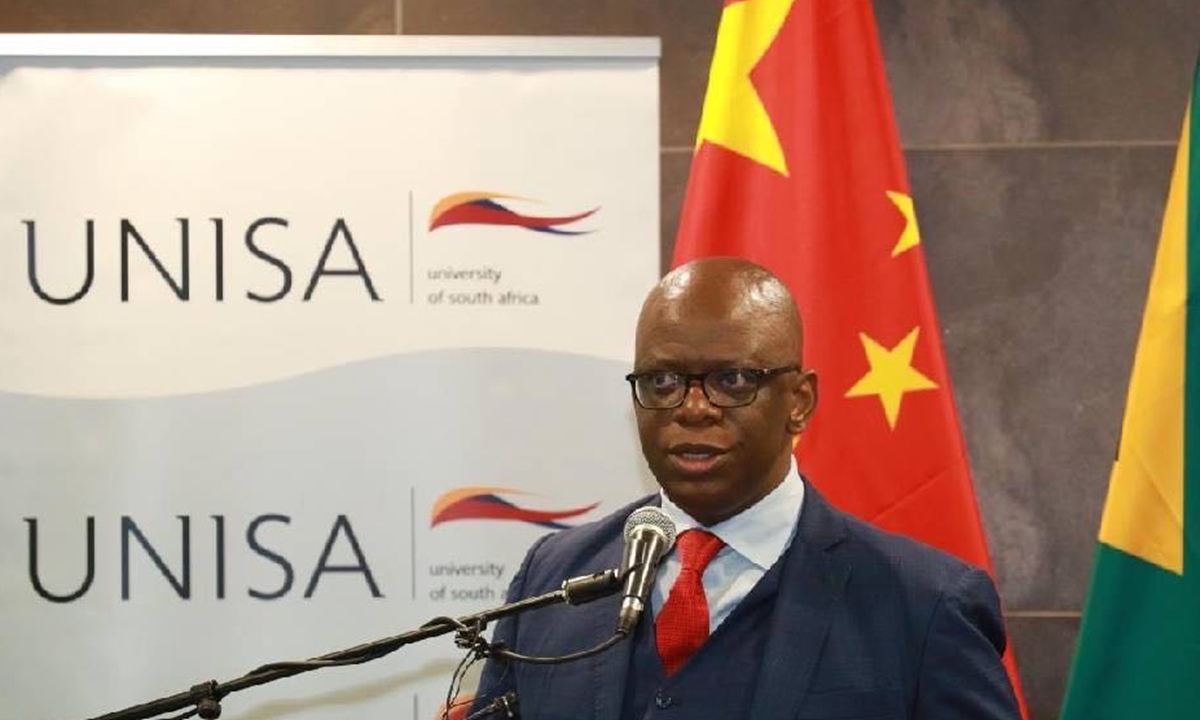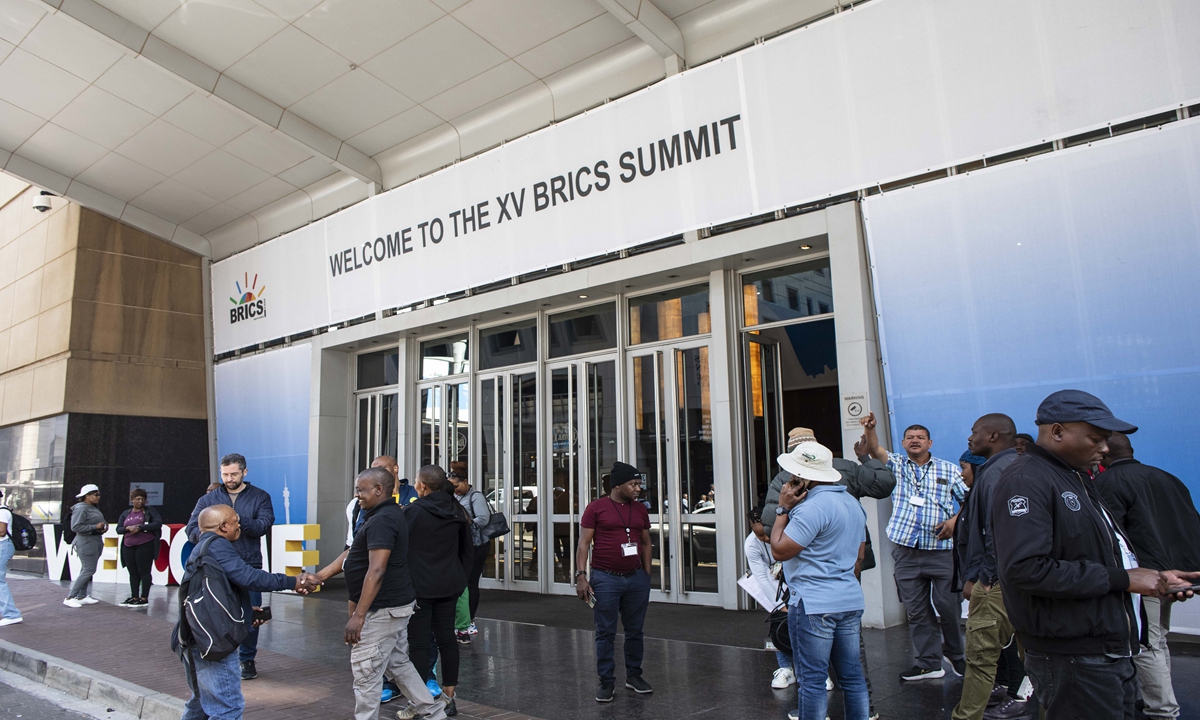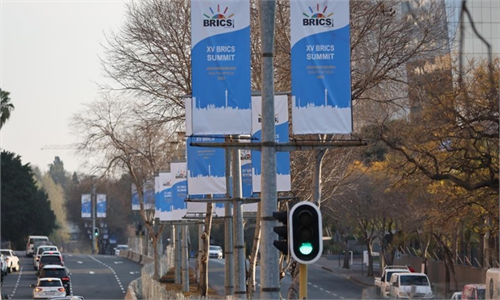IN-DEPTH / DIPLOMATIC CHANNEL
China plays a critical role within BRICS; GDI, GSI, GCI winning widespread support: African professor
New multipolar future
Editor's Note:
The 15th BRICS Summit, scheduled to be held in Johannesburg, South Africa, from August 22 to 24, has garnered substantial international attention. This summit holds significant importance in prompting discussions on various fronts. Within the BRICS framework, what role does China play? How do African people view the cooperation between China and Africa? Global Times reporters Xie Wenting and Zhao Juecheng (GT) in Johannesburg interviewed David Monyae (Monyae), director of the Center for Africa-China Studies at the University of Johannesburg, to delve into these crucial matters.

David Monyae, director of the Center for Africa-China Studies at the University of Johannesburg Photo: Courtesy of Monyae
GT: As the 15th BRICS Summit approaches, what are your expectations for the summit?
Monyae: The BRICS Summit in Johannesburg is going to be a major shift from a number of previous BRICS summits. Unlike previous BRICS summits, more countries said they are willing to join the organization. This is indeed a turning point. The discussions that we are looking forward to are the creation of a modality and criteria of how to join and who joins.
There is also the issue of unhappiness with the US dollar and how it is being used as a weapon. And the question of de-dollarization is going to be a central key on the agenda. However, I don't think that there will be a BRICS common currency. What I'm expecting to come out is BRICS countries trading with each other using their own local currencies. I think the other massive blow to the US dollar will come in the form of digital currencies.
Additionally, I think we should look into the communication issues of finding a better way for people-to-people exchanges among African countries. These are the issues that are critical for South Africa, critical for my own continent, Africa, and the Global South as a whole.
GT: How would you assess China's role within the BRICS?
Monyae: China is indeed a major BRICS member, major in the sense of the size of its economy which is massive and the second largest in the world. China has been making lots of breakthroughs in technology and in its infrastructure development. I think China has more to offer to fellow BRICS countries, and it is playing a critical role at this juncture. The Belt and Road Initiative (BRI), the Global Development Initiative (GDI), the Global Security Initiative (GSI), as well as the Global Civilization Initiative (GCI) are getting more and more support in the Global South. It is in line with the thinking within the developing world to transform the United Nations and its agencies, ensuring that you work on security, development, and civilization simultaneously to achieve long-lasting peace and security.
GT: At least a dozen countries reportedly wanted to join the BRICS. What are the reasons behind these countries' desire to join the mechanism?
Monyae: The motives include the interests in the organization's economic development potential and their desire to build a more equitable global order.
What is key is that these emerging powers are unhappy with the current global order. For these emerging powers, when they look at the current global order led by the US and Western countries, the system hasn't evolved since 1945. It hasn't been changed to reflect the current realities in terms of the size of the economy, population, and other issues.
There is also unhappiness with the weaponization of the US dollar and the weaponization of some global public goods, such as SWIFT, in the aftermath of the Russia-Ukraine conflict. We have witnessed the Western world imposing sanctions on a number of countries, which has led to a rethinking within the developing world. They now recognize the need to work within the BRICS for economic reasons. If we consider the combined GDP of BRICS countries, it is now larger than the GDP of the G7.
The G7, by name, may not reflect the true strength of their economies as it once did. I believe what we are witnessing is the decline of the Western world in economic terms. This decline will not happen overnight, but the trend consistently points downward rather than upward. Therefore, I think this is of concern to the US and other Western countries.
I believe that developing countries aspire to strengthen their voices in determining how to manage their own economies and address climate change issues. They seek to establish a powerful presence among the developing nations, advocating for an equitable global order.
GT: The discussion of the expansion of the BRICS has raised concerns among Western countries, with some suggesting that it could pose a threat to the West. What is your perspective on this matter?
Monyae: Actually, I have edited a book on the BRICS in which I talked about it playing a complementary role rather than challenging the West. Regarding trade, I believe the traditional trade routes will still exist, but with the introduction of the BRI and BRICS in various sectors, we are likely to witness a multiplicity of currencies in the global basket of currencies. It gives countries a better chance to finance infrastructure and a number of other things. And there are better options in terms of which currencies they want to use, rather than having one singular US dollar and trade route. I believe you will see that trade does not have to go through Europe. Transportation does not have to go through Europe. There will be more direct flights among BRICS countries.
I think developed countries don't need to see the BRICS as a threat. It is an opportunity to negotiate and find answers to issues affecting global peace and security.
GT: Do you think that emerging economies represented by the BRICS and other organizations can still be a driving engine for global economic development?
Monyae: No doubt about it. I think the future is in the Global South. It is something that is mentioned and accepted by the developed countries themselves. Why am I saying that? I think it has to do with trends, considering the large population numbers in the Global South. However, trade is not fairly benefiting the Global South at the moment. But I believe that we will begin to see new ways of doing things through catalytic technologies that bring developing countries closer together. I am more positive that the future lies with the Global South.
GT: Do you think that the expansion of the BRICS is necessary and beneficial for the organization's development?
Monyae: I think the expansion is vital. You cannot have only five countries from the Global South speaking on behalf of the entire club. It is important to ensure that these countries represent a much wider range of nations and regions. We cannot continue to criticize the West while recreating similar dynamics within our own group. Therefore, we must avoid contradictions. Expansion is a natural progression that must occur. Previously, we had what was known as the Group of 77 and China within the United Nations. I believe that the expansion of the BRICS is going to revive the Global South massively. You cannot ignore countries such as Indonesia, Egypt, Argentina, and others who wish to join. These countries bring significant contributions to the global sector through their culture, knowledge, and natural resources among others. It is crucial for them to speak as one and converge to confront the worst challenges.

Final preparations are underway for the 15th BRICS Summit at the Sandton Convention Center, Johannesburg, South Africa, on August 20, 2023. Photo: IC
GT: How do you envision the trajectory of the BRICS in shaping the future of international relations, trade, and economic development?
Monyae: I think taking a gradual approach is important. I think the BRICS also needs to move from rhetoric to practicality and find solutions to challenges that people in member states face. We in South Africa are facing a challenge in energy, for instance. And China has been playing a critical role in assisting South Africa to overcome the energy crisis. Across the African continent, there are numerous challenges, such as building bridges, dams, and airports, among others. Therefore, I believe that increased cooperation and collaboration are necessary, not only between Africa and China but also with India, Russia, and other new members.
By harnessing this energy, they will be able to address the key issues that people in the developing world face. These issues are quite simple: Food security, a change in our understanding of climate and the development of resilient approaches to climate change, as well as peace and development. More importantly, it is going to filter into the global institutions of global governance: The United Nations General Assembly, the United Nations Security Council, the World Trade Organization, and the World Health Organization.
GT: The concept of "de-dollarization" is currently a prominent topic, even within BRICS countries that are deliberating the possibility of a common currency. How do you assess the outlook for "de-dollarization" on a global scale?
Monyae: I don't foresee the likelihood of a BRICS currency coming out of the discussions this time. However, what I see as more likely is the start of a conversation to de-dollarize. I think the digitalization of BRICS countries' currencies is a threat to the US. With digital currencies, you don't need US dollars.
There is going to be a de-dollarization, but not overnight. There's going to be the thought of adding new additional global currencies in the global basket that give countries the ability to trade and finance infrastructure, which is an advantage for the Global South. The internationalization of RMB is ongoing. I think that of all BRICS countries, China has an advantage. It has established itself as a major country in trade, so it is easy for China to enter into agreement with many of these countries at a bilateral and regional level.
I believe that in the future, it's going to be a basket full of currencies. And there will be a very interesting world order, a multipolar world.

A view of sunrise over Johannesburg, South Africa Photo: VCG
GT: This year marks the 10th anniversary of the BRI. In what ways do you believe BRI programs have impacted Africa's development agenda?
Monyae: The BRI has played a critical role in Africa. We've seen major projects in Africa, such as ports, roads, power stations, and speed trains. Actually, we also see China playing a critical role as it has adopted a new approach to dealing with Africa different from the West. In Zimbabwe, for example, Chinese companies are open-minded and no longer solely focused on extracting resources and sending them to Europe. Instead, they are now prioritizing the beneficiation needs of developing countries.
BRI programs have also created more job opportunities in Africa. I believe that these kinds of initiatives are beneficial to the world, especially in terms of Africa's development.

